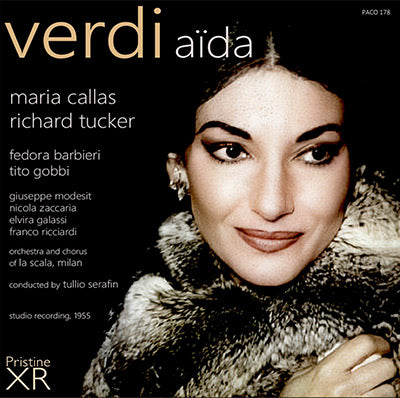
This album is included in the following sets:
This set contains the following albums:
- Producer's Note
- Full Track Listing
- Cover Art
Enter Aida: Callas is a great artist. I believe that at any time she would be so considered and having recently heard her Lucia from the second row of the stalls, I aver that faults or no faults, one is in the presence of a tremendous singing-artist whose will-power and art are brandished at you in such a way that faults "mean" nothing. Often in this Nile scene in the silence under the moon, she will caress a phrase as lovingly as Kreisler or Mischa Elman, fining her voice, colouring it, giving the words a heartfelt meaning which - that hall-mark of his histrionic genius - surprises us. Just as in the sentence in the Forza monastery scene, "Vergin m ' assisti" she gets far more out of the dramatic meaning than her rival Tebaldi, so here too there are dramatic points wonderfully brought off which Tebaldi, ever steady and appealing, hardly makes us notice. Yet Tebaldi is so much steadier, and produces tone which is so infinitely more sympathetic that one cannot in the long run and for repeated playing fail to prefer the suave Italian to the agitating American-Greek soprano. At least so say I, with my ears unable to rid themselves of the memory of the toppling yowl of Mme Callas's high A and high C, even if real tears stood in my eyes as she cried to Tito Gobbi: "Padre, son maladirmi; schiava non son": which is marvellous, like Lucia's "Alfin son tui". an artist, but how incomplete - to alternate ecstasy and irritation!
The Gramophone, January 1956 (excerpt)
Aida was the final magnificent work of Verdi's second period, using every element of his art: sublime large-scale choruses and poignant arias, pageantry, dance, spectacle and exoticism are all here, confirming his status as one of the greatest musical dramatists. The theme is doomed love – Radames, a Captain of the Egyptian guard falls for Aida, an Ethiopian slave; he sings her one of the great tenor arias 'Celeste Aida'; other memorable moments are Aida's 'Ritorna vincitor' and 'O patria mia' and their duet before being entombed alive 'O terra, addio'.
Callas’s Aida is an assumption of total understanding and conviction; the growth from a slave-girl torn between love for her homeland and Radames, to a woman whose feelings transcend life itself, represents one of the greatest operatic undertakings ever committed to disc. Alongside her is Fedora Barbieri, an Amneris palpable in her agonised mixture of love and jealousy – proud yet human. Tucker’s Radames is powerful and Gobbi’s Amonasro quite superb – a portrayal of comparable understanding to set alongside Callas’s Aida.
Tullio Serafin’s reading is in the central Italian tradition of its time. That’s to say, it’s unobtrusively right in matters of tempo, emphasis and phrasing, while occasionally passing indifferent ensemble in the choral and orchestral contribution. Although the recording can’t compete with modern versions (it was never, in fact, a model of clarity), nowhere can it dim the brilliance of the creations conjured up by this classic cast.
Gramophone, May 2015
VERDI Aïda
DISC ONE
1. Preludio (3:46)
ACT ONE, SCENE ONE
2. Sì: corre voce che l'Etiope ardisca (1:33)
3. Se quel guerrier io fossi! (4:30)
4. Quale insolito gioia nel tuo sguardo (3:26)
5. Vieni, o diletta, appressati (2:56)
6. Alta cagion v'aduna (3:17)
7. Su! del Nilo al sacro lido (2:57)
8. Ritorna vincitor (6:41)
ACT ONE, SCENE TWO
9. Possente, possente Fthà (3:09)
10. Immenso, immenso Fthà! (3:00)
11. Nume, custode e vindice (3:51)
ACT TWO, SCENE ONE
12. Chi mai fra gl'inni e i plausi (2:59)
13. Danza di piccoli schiavi mori (3:11)
14. Fu la sorte dell'armi a' tuoi funesta (5:34)
15. Pietà ti prenda del mio dolor (4:26)
ACT TWO, SCENE TWO
16. Gloria all'Egitto, ad Iside (3:25)
17. Marchia trionfale (1:39)
18. Ballabile (4:19)
19. Vieni, o guerriero vindice (2:14)
20. Salvator della patria, io ti saluta (2:09)
21. Che veggo! Egli? Mio padre! (1:16)
22. Quest'assisa ch'io vesto vi dica (2:10)
23. Il dolor che in quel volto favella (2:14)
24. O Re: pei sacri Numi (5:14)
DISC TWO
ACT THREE
1. O tu che sei d'Osiride (4:42)
2. Qui Radamès verrà! (7:03)
3. Ciel! mio padre! (8:07)
4. Pur ti riveggo, mia dolce Aida (3:04)
5. Fuggiam gli ardori inospiti (6:18)
6. Ma dimmi: per qual via (3:19)
ACT FOUR, SCENE ONE
7. L'aborrita rivale a me sfuggia (3:08)
8. Già i Sacerdoti adunansi (6:38)
9. Ohimè! morir mi sento! (8:06)
10. A lui vivo la tomba (3:22)
ACT FOUR, SCENE TWO
11. La fatal pietra sovra me si chiuse (5:18)
12. Immenso, immenso Fthà (5:42)
CAST
Maria Callas - Aïda
Richard Tucker - Radamès
Fedora Barbieri - Amneris
Tito Gobbi - Amonasro
Giuseppe Modesti - Ramfis
Nicola Zaccaria - Il re d'Egitto
Elvira Galassi - Una sacerdotessa
Franco Ricciardi - Un messaggero
Chorus and Orchestra of the Teatro alla Scala, Milan
conducted by Tullio Serafin
XR remastered by Andrew Rose
Recorded 10-24 August 1955, Teatro alla Scala, Milan
Cover artwork based on a photograph of Maria Callas
Total duration: 2hr 24:40 CD1: 79:54 CD2: 64:46

